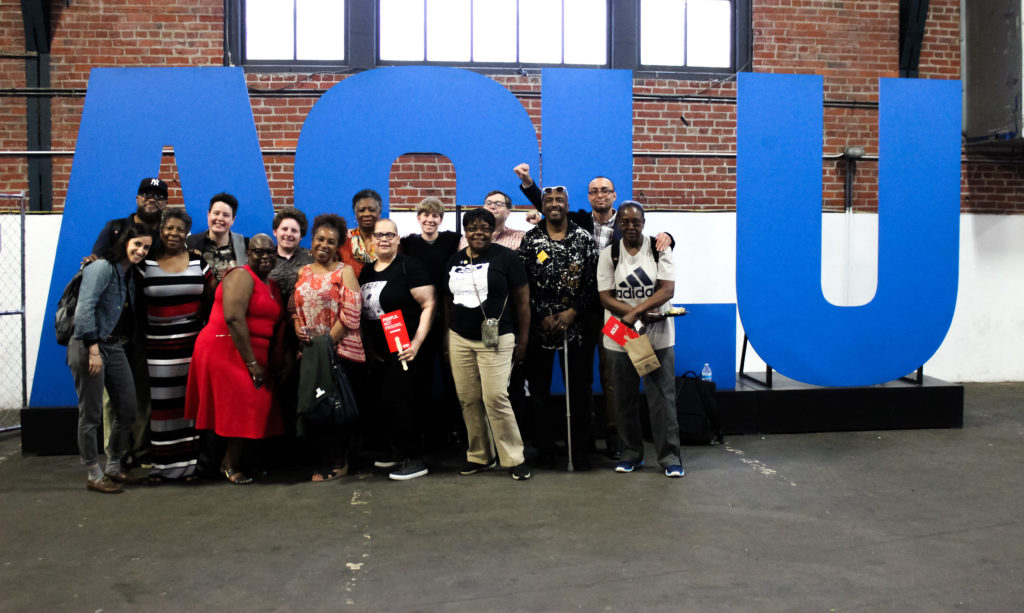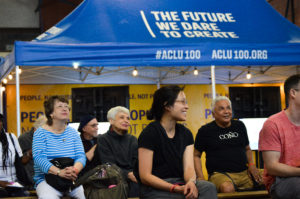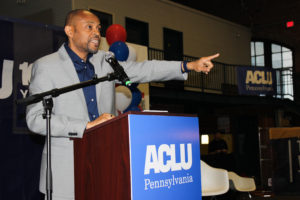ACLU takes its show on the road
 May 29, 2019
Category: Featured, Medium, Purpose
May 29, 2019
Category: Featured, Medium, Purpose
The silver lining to the Trump presidency, some argue, is a growing interest in grassroots activism.
Probably no organization has benefited more from this trend than the venerable American Civil Liberties Union (ACLU) whose national membership quadrupled to 1.85 million after Trump’s election, mirroring a growing outrage over attacks on civil liberties.
Traditionally, the ACLU has fought its social justice battles in the courtroom and the halls of legislatures across the country, but now it is taking its fight to the streets in the form of grassroots advocacy and voter education. The goal is to tip elections in favor of civil liberties and to drive policy. This new thrust was evident in a free 15-city nationwide tour the ACLU is sponsoring in the run-up to its 100 birthday in 2020. It combined celebratory performances and food, with lectures from experienced activists alongside immersive exhibits of the most pressing social justice challenges.
It was a far cry from legal briefs and policy papers, but was it effective?
“I can only speak to the Philadelphia stop of the tour,” said Reginald T. Shuford, executive director of ACLU-PA, the statewide ACLU affiliate. “Given the high-level and wide-ranging programming available — from Afro-Brazilian Drumming, spoken word, a performance by the talented artist Victory Boyd, Drag Queen Story Time, and a peace and justice yoga session, to an inspiring panel on criminal justice reform that included returning citizens, Q&A and a live podcast featuring ACLU-PA staff and immersive experiences on immigration, mass incarceration and voting, I would say, ‘Yes!’ And the feedback was great.”
Philadelphia, which was the next-to-last stop on the tour that started in Austin and will end on June 1 in New York City, played host to ACLU100 on May 22 and 23 at the 23rd Street Armory. Billed as a family-friendly experience to engage with the biggest fights for freedom, the local stop also included the ACLU-PA Greater Philadelphia Chapter annual gathering where the Coalition to Abolish Death by Incarceration (CADBI) was awarded the group’s 2019 Torchbearer Award that seeks to honor those who excel in working to protect the civil liberties of people in the Philadelphia region. CADBI is fighting the life without parole sentence that swept through the country as people demanded harsher punishments.

The Coalition to Abolish Death by Incarceration (CADBI) was awarded the ACLUs 2019 Torchbearer Award. (Courtesy photo)
“This year’s decision to honor CADBI was easy, given its work to organize and empower the people most affected by Pennsylvania’s draconian and immoral practice of sentencing thousands of its residents to die behind bars,” Shuford said. “Because of their commitment, hard work, and their belief that no human being is beyond redemption, CADBI has managed to start a statewide conversation that very few would have thought possible only a few years ago. CADBI’s fight to push forward legislative change for the more than 5,000 Pennsylvanians serving life sentences without the possibility of parole is transformative to the Philadelphia community. They are leaders in the movement to radically change our criminal justice system. We are proud to call them allies.”
Philadelphia has been called the Cradle of Liberty because of its rich social justice history. Both the Declaration of independence and the Constitution were penned here and the city has a rich abolitionist history. The Greater Philadelphia chapter of the ACLU was started in 1951 when the city’s Citizen’s Council on Democratic Rights voted to affiliate with the national ACLU. The major issue at the time was President Truman’s Loyalty Review Boards which were conceived to investigate the loyalty of government employees.
But contemporary Philadelphia suffers from a laundry list of social justice ills which, Shuford argues, stems from poverty and racism. “There are many (issues), including Philadelphia’s status as the poorest largest city in America. Poverty affects many aspects of life, for example, housing, employment, education and interactions with the criminal legal system,” Shuford said. “Relatedly, systemic racism still pervades every system/institution in Philadelphia, whether it be our schools, our police, or our criminal legal system.”
The ACLU100 tour highlights the fact that law and justice aren’t synonymous and that making a difference will have to begin at the local level. For Philadelphia, Shuford said, that means remaking a criminal justice system into one focused on fairness.
“Investment in a smarter and more equitable system is critical,” he said. “That includes reentry. Much of that investment has to take place in communities that are the most targeted and impacted that means diverting money previously spent on the criminal legal system and investing in non-punitive alternatives to incarceration, among other things. “
Trending News











